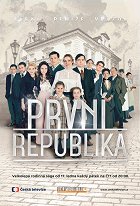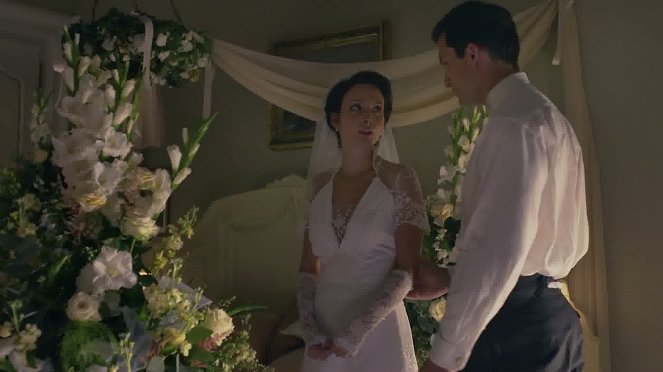Composer:
David SolařCast:
Ján Koleník, Markéta Plánková, Jiří Vyorálek, Jan Vlasák, Veronika Arichteva, Radek Holub, Viktor Dvořák, Robert Urban, Tomáš Töpfer, Zdena Studenková (more)Seasons(3) / Episodes(49)
Reviews of this series by the user NinadeL (3)
Season 1 (2014) (S01)
Originally a 22-part series, it’s been edited into 11 TV movies for DVD purposes. The plot is much more compact, and the performances can be evaluated better because they really match the character development. It's not perfectly retro, but considering how things developed in the Czech Republic after 1945 (there are still popular films and series from the 1960s, for example, that have nothing period-like about them), it's still a step forward. There’s a bit of nostalgia, a few good ideas, the courage to choose an erotic enterprise as one of the recurring settings, the effort to involve real events in the plot, to imitate the contemporary press, and to highlight new developments in culture and fashion. All of this is quite significant. A trio of families whose fates are linked has been a natural theme for TV sagas since The Forsyte Saga. The most adorable, and by far the funniest, are the acting etudes of Zdena Studenková as Mrs. Škvorová, the sugar maid, Markéta Plánková as the daughter of the Lébls, who married Valenta Vehicles, and of course Ján Koleník as Vladimír's main lover. I also appreciate the storyline with the clothing salon reminiscent of the famous series The House of Eliott. In the end, I was even looking forward to watching the gossipy adventure come to a melodramatic end. In addition, the whole plot corpus works in the 1918-1920 period, so there’s no possibility for it to drag. Flashbacks are dated to 1910, with one front flash even going as far as 1928. At the very end, the crime plot picks up, the individual characters go through purification, and nobody trusts anybody. It's interesting to watch because the setting is still very attractive, the spa is a new relevant topic and it's the unexpected gypsies on the farm who manage to solve the ghost subplot. It's just too bad that with the last episodes, the costumes of the main female characters became a bit tired, which mostly dehumanized the performances of Plánková and Nová, who could otherwise shine even in potato sacks, but the sacks would have to be different every time. In any case, the finale is excellent, and after the basic "Who was the killer?" question is solved, re-watching the series in its entirety takes on a new dimension. It was a joy to watch and will be again.
()
Season 2 (2017) (S02)
The new series takes place at the turn of 1928 and 1929. A lot has changed. The main romance doesn't have as much of a spark anymore, although Plánková and Koleník still have a lot to offer. They are replaced by Vyorálek and Boková. Logically, the main theme is progress, and the two daughters of the Valenti family, the doctor and the chauffeur, are interesting. With the Škvors, it's also nice to see emancipation (Arichteva) and elegance (Studenková) moving forward. Emphasis is placed on the legacy of the legions and the complex relations with Germany. The army has luster and traditional values still mean something. Yes, the sets, costumes, and make-up are again very loosely inspired by the real Republic. This series is a beautiful example of how that time period is viewed today and as such will only be appreciated years later. This is not a meticulous documentary, but a fictional recollection of an era we would like to remember. And that comes at a price. With or without a believable crime story.
()
Season 3 (2018) (S03)
The last series is set at the turn of 1930/1931. Like the second season, the third is a shortened, pleasantly compact season. The main storylines revolve around Maria and Jaroslav and the boxing clashes between the Sokol and Turner teams. Irena von Lippi was recast (which actually helped, because Anna Fialová was more adolescent and Katarína Šafaříková managed to portray Irena as a mature personality). However, the concentration on another crime plot made the series distant from the realities of the time, the construction of the studios at Barrandov was only briefly mentioned, and there was more talk about Max Schmeling, but no actor played him. No one knows what happened to the original idea of a family saga that would experience the entire First Republic. I consider Petr Vondráček's non-acting and the fear of showing key events that are talked about before and after but are not shown even in a short shot (not only Schmeling's hospitality match, but also Marie and Jaroslav's wedding) to be the biggest negatives. Somewhere on the borderline, there is an attempt to portray Veronika Arichteva's character as a female vamp even in the most banal scenes, while the better storylines include those of Petra Jungmanová, Jitka Schneiderová and Maroš Kramár, because they all have something to do and look good even in this light retro. Trnavský and Studenková’s lines were promising, but unfortunately there wasn't much room for them. The Dramedy creators left the series so that if they wanted to they could build on it, but if they didn't want to it wouldn't fundamentally matter. It could have been better, of course, but by the current standards of Czech Television, they still managed to make an interesting series whose message is obvious and not a waste of time. Those who have a deeper interest in this time period can easily find more information, and those who have never heard of the First Republic before can be inspired and imagine that time in a slightly different light.
()

